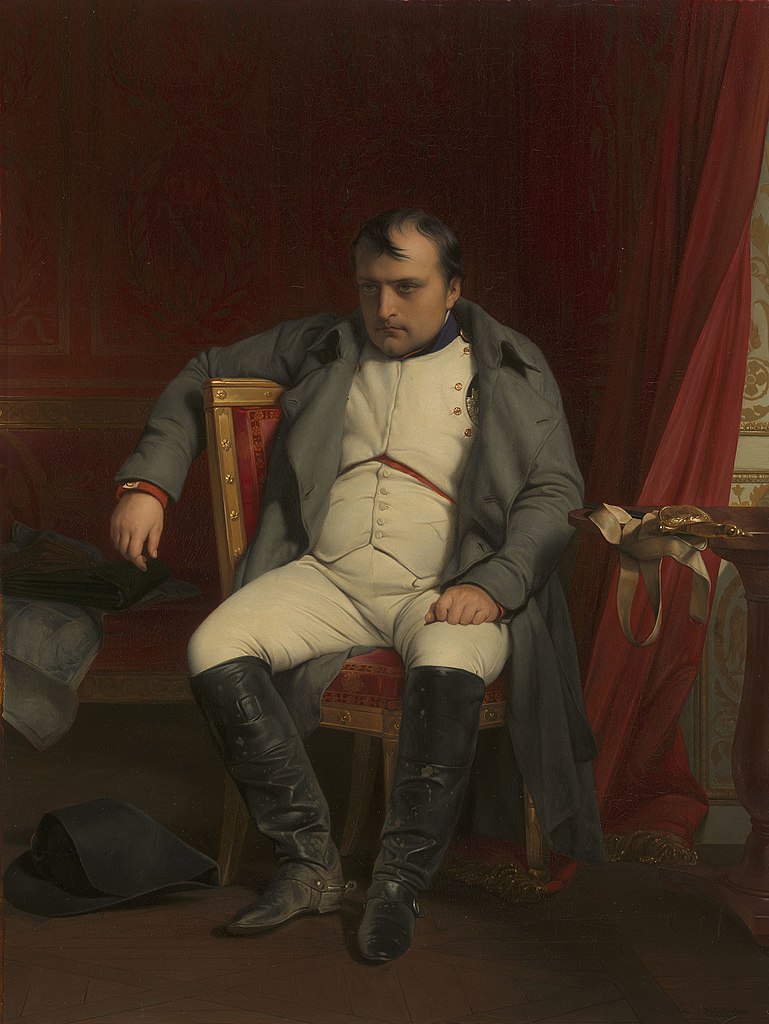Why, Sir Ridley?
A boring biopic about the Corsican upstart deals with the complex character of Napoleon Bonaparte with all the subtlety of an 18-pounder cannon.

The historian Adam Zamoyski once quipped about Napoleon’s greatness by recounting an apocryphal incident of Napoleon trying to pick up a lady of the night at Paris’s famous red-light district a couple of years before the Revolution that wrecked Europe. An eighteen-year-old young gunnery officer with a funny accent, he finally succeeded. Then, Bonaparte, being who he was, wrote about it all in his diary elaborately. What was important in that peculiar confessional was not that he managed to finally bed a paid working girl, but that he tried the same thing and failed thrice before. Zamoyski observed drily that, if an officer of the French artillery cannot manage to pick up an escort, there are reasonable arguments to be made that the performance might not be considered as some hallmark of forthcoming greatness.
It is interesting to note that Count Zamoyski himself is of aristocratic stock, with a family name and crest dating back to the fifteenth century. His bemused disdain towards the Corsican upstart was in some ways part of a noble European tradition—it is in the blood of aristocracy to make fun of classless upstarts.
The reality is, as always, complex. Bonaparte has defied historical characterization, but the fact that he was one of the Great Men of History, who due to his sheer ambition shaped his time, is beyond any doubt. Many historians, both professional and amateur, have tried to explain Bonaparte and his times, the latest such attempt made by one who despises professional historians.
Sir Ridley Scott’s latest offering, a biopic of Bonaparte, deals with the complexity with all the subtlety of an 18-pounder cannon firing grapeshot at the Royalists during the 13 Vendémiaire. I was invited to a special screening of the movie. It has been eighteen hours since, and I am still not quite sure what I watched, and what its point was. Admittedly, it is the mark of creative historical genius to create something so intellectually ambivalent that generations aspire to debate that in the years to come. Ambivalence and senile confusion are, however, two entirely different things.
The film starts with Napoleon in the middle of a crowd in Paris, watching the decapitation of Queen Marie Antoinette, who faces humiliation even after her death when the executioner holds her head by her blond curls. Neither of those things happened—Napoleon wasn’t in Paris during the execution and the queen’s hair was shaved before execution. If it were not for what follows, we would let both of these inaccuracies pass for the sake of creativity.
Bonaparte watches the savage reaction of the subaltern with practiced and hidden revulsion, and then heads to the Directory in a chaotic Paris. The film then quickly moves between the beheading of Robespierre and the Directory’s release of political prisoners, including the future Empress Josephine, who is introduced to Napoleon in a revolutionary ball. Josephine, who was in reality six years older than Napoleon, is played by Vanessa Kirby, 14 years younger than the 49-year-old Joaquin Phoenix (playing a 26-year-old Napoleon).
The film then quickly cuts to the siege of Toulon, the first sign of Bonaparte’s military “genius,” where he almost gets himself killed by a stray cannonball while trying to retake the fort from the British expeditionary marine infantry. Napoleon returns victorious and gets back to wooing Josephine with all the charm of Norman Bates. That is pretty much how the rest of the mess of a movie goes.
The core problem of this movie is not that it is ahistorical; it is that it is acausal. Scott jumps from one event to another, trying to rapidly cover a span of a quarter century of Napoleonic wars but failing to explain how or why they are linked. Most major wars aren’t mentioned. It is not explained why Napoleon was deemed a tyrant; nothing was said about his acquisition of that reputation after needlessly massacring Syrians during his Egyptian campaign. It is not even mentioned as to why France deemed Egypt to be so important. (It was to choke British interests in India, as most French foreign policy, revolutionary or imperial, was essentially predicated upon balancing Britain.)
Not a single naval battle—Copenhagen, Nile, Trafalgar—is mentioned. There is no mention of Nelson or Metternich or Castlereagh. Without the naval context, it is almost impossible for non-historians to comprehend why Napoleon turned increasingly erratic and paranoid about the Royal Navy choking off the entire continent. Without his growing paranoia, it is difficult to explain the Austrian and Prussian fear, or eventual Russian betrayal.
Of the major land wars, Marengo isn’t mentioned. Austerlitz gets the highest screen time, with striking visual set pieces of Austrians trapped on an icy lake. Borodino, on the other hand, gets around three minutes, where we only see a jumble of men trying to butcher each other amidst a hail of cannonade in a monotoned, shadowy, and bland visual farrago—the technical term is apparently “desaturation”—which makes it difficult to decipher who is butchering whom. Both French and Russian uniforms look the same in that darkened hue. It is not explained why Borodino was a pyrrhic victory for Bonaparte. It is not mentioned how Caulaincourt and Talleyrand warned Napoleon from venturing into the stupidest mistake any general can make, marching on to Russia during winter, and what a petty, thin-skinned man Bonaparte was in return.
The whole movie had periods of drawn-out bizarre expositions in the form of linear narration, with someone or the other reading letters or such, and the main characters all looking at the distance with a smoldering thousand-yard stare. A key to good art is the concept of “show, don’t tell.” This was akin to reading a Wikipedia page with a documentary running on mute in the background.
Scott bought wholesale the myths of both the classless and emotionally deficient Napoleon and the Napoleonic military genius. Unfortunately, this is a reversal of the truth, as any genuine historian worth his salt would have told him. There is no actual evidence of Napoleon being classless to the point of slapping or humiliating Josephin in public, as shown in the movie. It is also not clear why the entire film hints that Napoleon’s actions, from his return from Egypt to his return from Elba, were due to him trying to impress Josephine.
One should take all such character assassinations of Napoleon with a pinch of salt, as most of them are descended from wartime propaganda. The older houses of Europe hated the revolutionary chaos, but initially preferred an uncouth tyrant who restored order. They then hated Napoleon, quite simply because they could never trust his mercurial nature, his manners, and his ambition. Power begs to be balanced.
The myth of his military genius, however, is far-fetched. Napoleon was a child of the Enlightenment, arguably the first modern meritocrat. He was accompanied by scientists, archaeologists, and historians during his campaign in Egypt, who treated it as a study trip, unthinkable at that time. He was also a meritocrat by necessity; after the revolutionary chaos lopped off the heads of the cream of Parisian society, he had to replace career officers and generals with peasants and thugs. Some of that undoubtedly helped. Mobs in the early days of the war fought with more ferocity and ingenuity than the stolid professional armies of the rival European powers. The rival powers, however, led by genuine aristocratic intellects, learnt their lessons and adapted. Napoleon got complacent. The Russian campaign destroyed the Grande Armee, the greatest land force ever accumulated. For some reason, a “genius” like Napoleon couldn’t foresee the inevitable disaster. There is always a well, yes, but… when it came to Napoleon’s decisions.
The film aspires to a pinnacle on the fields of Waterloo, a battle of such immeasurable tactical manoeuvring and patience, calculation, and unforeseen bravery, that it would make any fictional war thriller look bland in comparison. Scott manages to make it insufferably pedestrian. As Arthur Wellesley was waiting for Blücher to arrive, I was desperate for any semblance of a plot to appear anytime. The entire sorry episode saw a scowling Wellington and random CGI cannonades, British infantry squares and circling cavalry charges, and Joaquin Phoenix doing his best depressed Joker impression. The reader must be wondering why the cavalry was circling or why the Anglos and the Scots were in squares, or what tactical mistakes Napoleon made in letting loose his mighty Imperial Guard at the final moment, guaranteeing their massacre in the hands of the Prussians. None of that is, of course, explained.
Robert Gibb, a late Victorian artist, painted what is quite possibly the greatest ever painting of a scene from Waterloo, titled Closing the Gates at Hougoumont, currently displayed at the National War Museum in the UK. The scene shows a very small band of Coldstream and Scots guards trying to bar and close the gates of the Chateau, a small but tactically important location on the fields of Waterloo. Every single stroke in that painting shows the feral, godless, and heroic moment—the superhuman rage and concentration in the faces of both the attackers and defenders, the vanguard of the French, the fallen British soldier trying to push the gate with his shoulders. The manic Frenchmen try to take the strategic position, knowing that every second lost could lead to their defeat and doom, only to be thwarted by a bunch of redcoats fighting till their bodies are bloodless and can take no more.
Hougoumont saw the French attack repeatedly and be stopped repeatedly; over 12,000 French troops were bogged down there throughout the course of the day. It trapped French soldiers in an impossible fight, draining away their valuable hours, and wrecking Napoleon’s plan of squaring off the numerical odds by taking the British and Prussians separately.
The painting is the typically superlative Victorian rendition of an event that quite literally changed the course of human history. Waterloo was the culmination of an age, rarely replicated since. It was the age of greater men walking the halls and fields in an era that defined who we are today, how we mark and address our houses, what laws we follow, and what languages of business we speak globally.
Napoleon is not an easy biopic to make. One shouldn’t begrudge the task. A success would perhaps make a bunch of cash, and will be rightly regarded as a cinematic epic. Yet to those rare few, genuinely interested in historical inquiry of the tumultuous 19th century, I’d humbly suggest reading good old history books and a trip to some older art museums over watching Scott’s latest.
The post Why, Sir Ridley? appeared first on The American Conservative.
Shop For Night Vision | See more…
Shop For Survival Gear | See more…
-
Sale!

Quick Slow Release Paramedic Survival Emergency Tourniquet Buckle
Original price was: $14.99.$7.99Current price is: $7.99. Add to cart -
Sale!

Mesh Shooting Hunting Vest with Multi Pockets
Original price was: $59.99.$39.99Current price is: $39.99. Add to cart -
Sale!

Tactical Camo Nylon Body Armor Hunting Vest With Pouch
Original price was: $49.99.$39.99Current price is: $39.99. Select options This product has multiple variants. The options may be chosen on the product page
















































